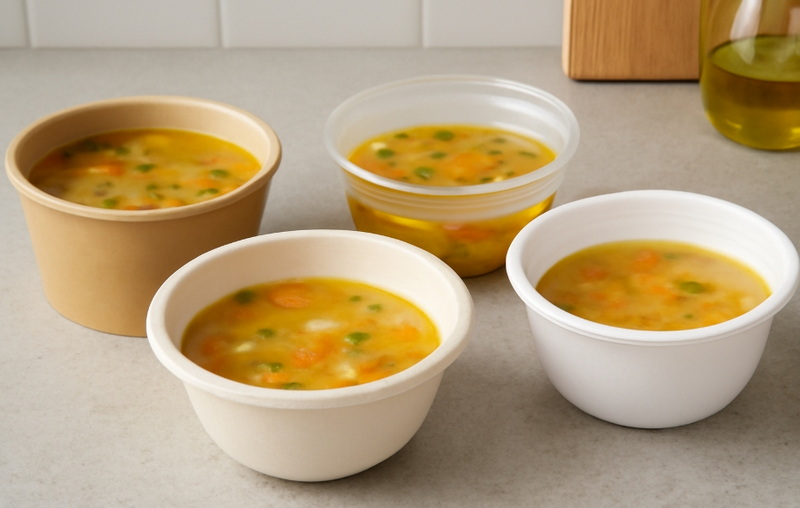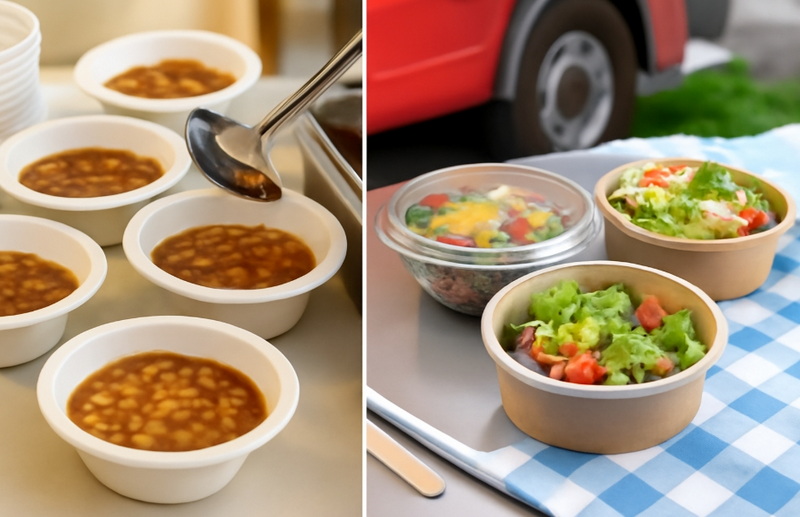
Content Menu
● Why Certifications Matter for Bowl and Lid Products
>> Benefits of Certified Bowl and Lid Products
● Key Certifications to Look For
>> Food Safety Certifications
>>> Food Contact Material (FCM) Compliance
>>> Good Manufacturing Practices (GMP)
>>> HACCP (Hazard Analysis and Critical Control Points)
>> Environmental and Sustainability Certifications
>>> Forest Stewardship Council (FSC)
>>> Compostable and Biodegradable Certifications
>>> EcoLabel Certifications
>> Product Quality and Performance Certifications
>>> ISO 9001: Quality Management Systems
>>> ASTM Standards
>>> NSF International Certification
>> Health and Chemical Safety Certifications
>>> BPA-Free Certification
>>> REACH Compliance (Europe)
>>> Prop 65 Compliance (California, USA)
>> Regional and International Certifications
>>> CE Marking (Europe)
>>> JIS Mark (Japan)
>>> Halal and Kosher Certifications
● How to Verify Product Certifications
>> Steps to Verify Certifications
● The Role of Certifications in Different Industries
>> Food Service Industry
>> Retail and E-commerce
>> Manufacturing
>> Healthcare and Institutional Use
● Common Misconceptions About Certifications
>> All Certifications Are the Same
>> Certification Is a One-Time Process
>> Certified Means Perfect
>> Only Large Brands Need Certification
● Conclusion
● FAQ
>> 1. What is the most important certification for food contact safety in bowl and lid products?
>> 2. How can I tell if a bowl or lid is truly compostable?
>> 3. Why is BPA-free certification important for plastic bowls and lids?
>> 4. Do certifications guarantee that a product is environmentally friendly?
>> 5. How often should manufacturers renew their product certifications?
Selecting the right bowl and lid products goes far beyond choosing an appealing design or convenient size. For both consumers and businesses, certifications are fundamental in ensuring that products are safe, high-quality, and compliant with industry regulations. Bowls and lids come into direct contact with food, making their certification status a critical factor for health, environmental responsibility, and market acceptance. This comprehensive guide explores the essential certifications you should look for in bowl and lid products, explains their significance, and provides practical advice for verifying and understanding these certifications.

Why Certifications Matter for Bowl and Lid Products
Certifications act as a guarantee that a product has been tested and meets specific standards established by regulatory agencies or industry groups. For bowls and lids, certifications are particularly important because these products are used to store, transport, and serve food. Without proper certification, there is a risk of health hazards, regulatory violations, and damage to consumer trust.
Benefits of Certified Bowl and Lid Products
- Consumer Safety: Certifications confirm that the materials used are safe for food contact and do not contain hazardous substances.
- Regulatory Compliance: Certified products adhere to national and international standards, reducing the risk of recalls or legal penalties.
- Quality Assurance: Certification processes often require rigorous testing, ensuring durability, performance, and reliability.
- Environmental Responsibility: Many certifications promote sustainable practices, which benefits both the environment and your brand reputation.
- Market Access: Certain certifications are mandatory for selling products in specific regions, opening up new market opportunities.
Key Certifications to Look For
Food Safety Certifications
Food Contact Material (FCM) Compliance
Food Contact Material compliance ensures that the materials used in bowls and lids do not transfer harmful substances to food. Regulatory agencies in various regions, such as the U.S. Food and Drug Administration (FDA) and the European Food Safety Authority (EFSA), set strict guidelines for FCMs.
- FDA (United States): Products must comply with FDA regulations for food contact materials, ensuring they are safe for use with food and beverages.
- EFSA (Europe): The European Union requires products to meet standards outlined in the Framework Regulation (EC) No 1935/2004.
Good Manufacturing Practices (GMP)
GMP certification demonstrates that the manufacturer follows standardized procedures to ensure product safety and consistency. This includes hygiene, traceability, and quality control measures throughout the production process.
HACCP (Hazard Analysis and Critical Control Points)
HACCP is a systematic approach to food safety that identifies and controls potential hazards in the production process. While often associated with food processing, HACCP principles are increasingly applied to packaging manufacturers to ensure food contact safety.
Environmental and Sustainability Certifications
Forest Stewardship Council (FSC)
For bowls and lids made from paper or wood, FSC certification verifies that the materials come from responsibly managed forests that provide environmental, social, and economic benefits.
Compostable and Biodegradable Certifications
- BPI Certified Compostable: The Biodegradable Products Institute certifies products that meet compostability standards, ensuring they break down in commercial composting facilities.
- EN 13432 (Europe): This European standard certifies that packaging is compostable and biodegradable under industrial conditions.
EcoLabel Certifications
EcoLabel certifications, such as the EU Ecolabel or Green Seal, assess the overall environmental impact of a product, including resource use, emissions, and recyclability.
Product Quality and Performance Certifications
ISO 9001: Quality Management Systems
ISO 9001 certification indicates that a manufacturer has implemented a robust quality management system, ensuring consistent product quality and customer satisfaction.
ASTM Standards
The American Society for Testing and Materials (ASTM) develops standards for product performance, including durability, heat resistance, and leak-proof qualities for bowls and lids.
NSF International Certification
NSF International certifies products that meet strict standards for public health protection, including food safety and sanitation.
Health and Chemical Safety Certifications
BPA-Free Certification
Bisphenol A (BPA) is a chemical used in some plastics that can leach into food and pose health risks. BPA-free certification ensures that the product does not contain this harmful substance.
REACH Compliance (Europe)
REACH (Registration, Evaluation, Authorisation, and Restriction of Chemicals) is a European Union regulation that restricts the use of hazardous chemicals in products, including food packaging.
Prop 65 Compliance (California, USA)
California's Proposition 65 requires businesses to provide warnings about significant exposures to chemicals that cause cancer, birth defects, or other reproductive harm. Compliance indicates that the product does not contain harmful levels of listed chemicals.
Regional and International Certifications
CE Marking (Europe)
CE marking indicates that a product complies with European Union safety, health, and environmental requirements, allowing it to be sold within the European Economic Area.
JIS Mark (Japan)
The Japanese Industrial Standards (JIS) mark certifies that products meet national standards for safety and quality in Japan.
Halal and Kosher Certifications
For consumers with religious dietary requirements, Halal and Kosher certifications ensure that bowls and lids are produced in accordance with specific religious laws and are safe for use with respective foods.

How to Verify Product Certifications
With the proliferation of counterfeit and misleading claims, it is essential to verify the authenticity of product certifications before making a purchase.
Steps to Verify Certifications
- Check for Official Logos: Authentic certifications usually feature official logos or marks on the product or packaging.
- Request Documentation: Ask suppliers for certificates and supporting documents issued by recognized certification bodies.
- Cross-Reference with Certifying Bodies: Visit the websites of certification organizations to verify the product or manufacturer's listing.
- Assess the Certifying Agency: Ensure the certifying agency is reputable and recognized in the industry.
- Stay Updated: Certification standards and regulations may change over time, so ensure the certifications are current and valid.
The Role of Certifications in Different Industries
Food Service Industry
Restaurants, cafes, and catering businesses rely on certified bowls and lids to ensure customer safety and comply with health regulations. Certifications also help businesses avoid legal issues and costly recalls.
Retail and E-commerce
Retailers and online sellers benefit from stocking certified products, as these are more likely to meet customer expectations for quality and safety. Certifications can also be a selling point for eco-conscious consumers.
Manufacturing
Manufacturers use certifications to demonstrate compliance with industry standards, open up new markets, and build trust with buyers and end-users.
Healthcare and Institutional Use
In healthcare and institutional settings, certified products are essential for maintaining hygiene and preventing contamination.
Common Misconceptions About Certifications
All Certifications Are the Same
Not all certifications carry the same weight or cover the same aspects. Some focus on food safety, while others address environmental impact or chemical safety.
Certification Is a One-Time Process
Certifications often require regular audits, testing, and renewal to maintain validity. A product certified years ago may no longer meet current standards.
Certified Means Perfect
While certifications indicate compliance with certain standards, they do not guarantee perfection. It is still important to follow proper usage and storage guidelines.
Only Large Brands Need Certification
Small businesses and local producers also benefit from certifications, as they help build credibility and consumer trust.
Conclusion
Certifications are a vital aspect of choosing safe, high-quality, and environmentally responsible bowl and lid products. They provide assurance that the product meets rigorous standards for food safety, quality, and sustainability. By understanding the different types of certifications and how to verify them, consumers and businesses can make informed choices that protect health, support sustainability, and enhance brand reputation. Always look for relevant certifications, verify their authenticity, and stay updated on changing standards to ensure the best outcomes for your needs.

FAQ
1. What is the most important certification for food contact safety in bowl and lid products?
The most important certification for food contact safety is compliance with food contact material regulations set by authorities such as the FDA in the United States or EFSA in Europe. These certifications ensure that the materials used do not leach harmful substances into food.
2. How can I tell if a bowl or lid is truly compostable?
Look for recognized compostable certifications such as BPI Certified Compostable or EN 13432. These indicate that the product will break down in commercial composting facilities and meet strict standards for biodegradability.
3. Why is BPA-free certification important for plastic bowls and lids?
BPA-free certification ensures that the product does not contain Bisphenol A, a chemical that can pose health risks if it leaches into food or beverages. This is especially important for products used with hot foods or liquids.
4. Do certifications guarantee that a product is environmentally friendly?
Not all certifications guarantee environmental friendliness. Look for specific eco-labels or sustainability certifications, such as FSC for paper products or compostable standards, to ensure the product meets environmental criteria.
5. How often should manufacturers renew their product certifications?
Manufacturers should renew their product certifications according to the requirements of the certifying body. This often involves regular audits, testing, and updates to ensure ongoing compliance with current standards.

















